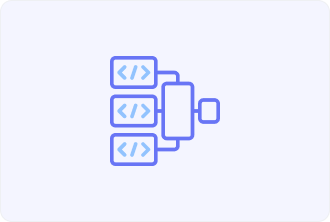Dependencies Definition

Dependencies — are external components that software depends on to function in the one right and well-defined way. They accelerate the creation of a program by putting into operation ready components of code (usually called “libraries”) that ensure supplying software with necessary functions, but without spending time on its engineering from the foundation.
Leveraged tools are beneficial for software development because they have already proven successful, having come through the testing period.
There are different directions of implementation of these assistive resources that can be used throughout the processes of writing code, installing programs and so on. Usually, when it comes to dependencies, it’s referred to direct – that are incorporated straightforwardly and transitive – libraries of direct dependencies.
The benefits of incorporating dependencies in code are these:
- They give an opportunity to pay special attention to the functions that are the most important in the development of a certain software.
- Integration of dependencies helps prevent the appearance of errors.
- Adding libraries instead of writing every single code by themselves, programmers save money for their clients.
How to manage dependencies?
Maintenance is a must have process when it’s related to inclusion of these auxiliary tools as neglecting leads to emerging dissonance. To keep those problems from happening, it’s crucial to manage them properly:
- Using special programs
Specialized software can help put an end to appearing errors and disharmony. There are plenty of them – Maven, pip, Bundler and Yarn that automate tracking and integration processes.
- Timely updates
It’s vital not to wait until being caught off guard by an unexpected crash, but to periodically conduct audits and check whether everything goes smoothly, updating them due to the fact that a selective method can cause inconsistency.
- Integrating only necessary tools
Adding libraries to software, as everything, needs limits. Unlocking new opportunities, frameworks increase the quantity of code that requires a special approach in maintenance. Therefore, by embedding additional libraries, it’s important to evaluate how useful it will be for the overall project.
Summing up, combination of correct tools, regular update schedules, and careful selection of outside libraries is what constitutes effective dependency management. By following this triple route, the software development teams are able to keep their software stable, secure, and efficient while at the same time reducing technical debt and the risk of unexpected interruptions.
Challenges with dependencies
Dependencies are worthy of using as they accelerate the development, yet as any other things, they have some key issue that should be taken into account while incorporating them:
- Managing dependencies – the most frequently discussed question about dependencies is its support. Including them in your software, you remove one kind of difficulty, but get another;
- Depending on a library or another tool, if something goes wrong, the software might not work in accordance with the expectations in view of that fact that an essential part is missing. Additionally, transitive libraries complicate the usage of tools as the chosen ones might have their own dependencies;
- License matters – not all the libraries provided can be implemented freely and embodying them in software without agreement with their owner can culminate in disputes and fines.